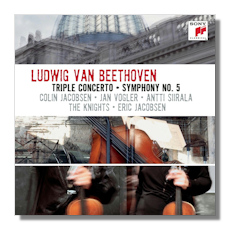
The Internet's Premier Classical Music Source
Related Links
- Beethoven Reviews
- Latest Reviews
- More Reviews
-
By Composer
-
Collections
DVD & Blu-ray
Books
Concert Reviews
Articles/Interviews
Software
Audio
Search Amazon
Recommended Links
Site News
 CD Review
CD Review
Ludwig van Beethoven

Triple Concerto
- Concerto for Violin, Cello, Piano & Orchestra, Op. 56 *
- Symphony #5, Op. 67
* Colin Jacobsen, violin
* Jan Vogler, cello
* Antti Sirala, piano
The Knights/Eric Jacobsen
Sony Classical 88725-47176-2
Well, this is different. Cellist Jan Vogler is easily the biggest name in this production, but this disc is a showcase for The Knights. The Knights are a New York-based chamber orchestra, composed of a wide assortment of diverse and youthful musicians of varied backgrounds. The symphony is common enough, but someone had the smarts to throw in the concerto as well. On the whole, the project is quite successful.
Conductor Eric Jacobsen shapes the concerto with an unusual amount of tension in the opening bars, and the result blossoms into a refreshingly extroverted take on a piece that frankly dies if you take it too seriously. The soloists have all worked intimately with the orchestra, and play extremely well, almost as if they were part of the framework themselves. There is a lack of heaviness that I really appreciated, even in the climaxes, which are as incisive and extroverted as you could want. At times, The Knights sound a touch light for Beethoven, but this is a work that needs as much clarity as it can possibly be given, and so I really liked the overall picture.
The middle Largo is really delightful; Vogler stealing the show with some really heartfelt playing. Here the orchestral forces do provide the necessary weight, and the flowing, clear approach becomes even more convincing. The Rondo is a fine ending, although I found the initial phrasing of the movement personal to the point of being questionable. Outside of that, it's a marvelous romp to the finish. It may not score over the classic readings of the work, but it's a serious contender if you find the work mannered or dour.
In the symphony, competition is of course a greater issue, and no amount of freshness of approach can change that. The opening bars are again thrilling in terms of how they are shaped, and ensemble balances are very good indeed. The brass ring out clearly and there is a real sense of discovery and purpose in a piece that has become routine. Jacobsen does not especially succeed in maintaining that tension all the way through the work, though. First movement climaxes are just a touch flat – the small forces don't help – and there is a certain mushy quality to the final pages of the great "fate" theme. Also, the last notes are held too long, further robbing impact. The Andante features stellar winds and much promise at the start, but again, the middle section seems tepid. The closing minutes of the movement grabbed me, however, and the third movement Scherzo retains this energy and purpose. The finale is good. I love the attention to details, but I feel like there is again something that just isn't there, and occasionally there is a hint of the orchestra rushing. Others may disagree, and the sound is very good throughout. There's a lot of great music here despite my reservations, so give it a try.
Copyright © 2013, Brian Wigman


















